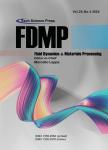Analysis of the Influence of Viscosity and Thermal Conductivity on Heat Transfer By Al_(2)O_(3)-Water Nanofluid
作者机构:Unit of Computational Fluid Dynamics and Transfer PhenomenaNational Engineering School of Sfax(ENIS)University of SfaxSfaxTunisia
出 版 物:《Fluid Dynamics & Materials Processing》 (流体力学与材料加工(英文))
年 卷 期:2019年第15卷第3期
页 面:253-270页
核心收录:
学科分类:080704[工学-流体机械及工程] 080103[工学-流体力学] 08[工学] 0807[工学-动力工程及工程热物理] 0801[工学-力学(可授工学、理学学位)]
主 题:Heat transfer nanofluid viscosity thermal conductivity
摘 要:The addition of nanoparticles into liquid,even at low concentrations,leads to an increase in both,dynamic viscosity and thermal ***,the increase in temperature causes an increase in thermal conductivity and a decrease in the nanofluid *** this context,a numerical investigation of the competition between viscosity and thermal conductivity about their effects on heat transfer by Al_(2)O_(3)-water nanofluid was conducted.A numerical study of heat transfer in a square cavity,filled with Al_(2)O_(3)-water nanofluid and heated from the left side,was presented in this ***,momentum,and thermal energy equations are solved by the finite volume *** the pressure-velocity coupling,the SIMPLER algorithm was *** working conditions,allowing the increase of heat transfer,are *** addition,two correlations for viscosity and thermal conductivity of Al_(2)O_(3)-water nanofluid as functions of the concentration and diameter size based on experimental measurement are *** correlations were more precisely compared to those given by the theoretical ***,other models for viscosity and conductivity depending on temperature are used and *** results reveal that heat transfer by Al_(2)O_(3)-water nanofluid is enhanced only when the temperature exceeds 40℃ and the diameter size does not exceed a certain limit of the order of 45-50 nm depending on temperature.



